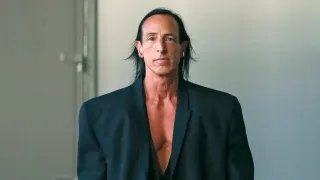
4 hours ago
Jack Woolley Reflects on Final “Drastic Weight Cut” and Lifelong Body Image Struggles
READ TIME: 3 MIN.
Jack Woolley, the Irish Olympic taekwondo athlete and prominent LGBTQ+ figure, has spoken out about his decision to end drastic weight cutting practices—a move that marks a significant milestone in his personal journey of self-acceptance and well-being. Woolley’s reflections, shared publicly and on social media, reveal the complex relationship elite athletes can have with food, body image, and the pressures of competition .
From a young age, Woolley was confronted with the realities of weight management in sport. In interviews, he has described how, at just eight years old, he was already conscious of his diet—an early sign of the challenges to come . By his teenage years, Woolley’s approach to weight cutting had intensified, leading to extreme behaviors such as weighing himself between classes and restricting food intake to meet stringent category requirements.
"So, there was me, eight years of age on a diet... It started becoming a regular thing, cutting weight, when I was about 14," Woolley recounted. He revealed that the habit of bringing scales to school stemmed not only from sporting ambition but also from deeper issues with food and body image that began in secondary school .
In a heartfelt social media post marking a year since his last major weight cut, Woolley described the significance of this milestone: “It’s been 12 months since your last drastic weight cut, a whole year since you decided to put yourself and your health first” . For Woolley, ending extreme weight management was not only a physical relief but a moment of reclaiming autonomy over his body and well-being.
Interviews from recent years reveal that Woolley’s relationship with food has been tumultuous, shaped by both personal and professional pressures. “Growing up, my mam always had issues with me eating because I was always skinny. But then with the weight in sport, I would say it’s not healthy at all. It’s something that I’m working on. I have a nutritionist and a psychologist, and I deal with weight a lot better now,” Woolley explained .
Woolley has spoken candidly about the mental and emotional toll of weight cutting, acknowledging that the psychological effects often outweigh the physical challenges. “With the physical side of it, it’s probably nowhere near as bad as the mental side of it,” he stated, drawing attention to the lasting impacts on self-image and mental health .
As an openly LGBTQ+ athlete, Woolley’s story resonates deeply within the community, where body image and mental health are often complicated by additional layers of stigma and expectation. His willingness to share vulnerabilities highlights the importance of representation and the need for inclusive support structures in sport.
Research consistently shows that LGBTQ+ individuals are disproportionately affected by body image concerns and eating disorders, especially in environments where physical performance is closely tied to identity and self-worth . Woolley’s openness challenges silence and shame, modeling resilience and self-compassion for younger athletes and fans who may be struggling.
Woolley’s account also calls attention to the unique pressures faced by athletes navigating puberty and developmental changes, particularly among transgender and non-binary individuals whose experiences of body image may differ from those of cisgender peers .
Moving forward, Woolley has prioritized health over competition, working with nutritionists and psychologists to develop sustainable routines. He has joked about the prospect of never stepping on a scale again after retirement—a sentiment echoed by many who have endured the rigors of competitive sport .
His story underscores the urgent need for sporting organizations to provide comprehensive support for athletes’ mental and physical health, including resources tailored to the needs of LGBTQ+ participants. By sharing his journey, Woolley not only advocates for change but also offers hope and inspiration to others who may feel alone in their struggles.
As he prepares for future competitions, Woolley’s focus is clear: “Performing to my potential in Paris is the next step. Hopefully no-one sees me crying on the telly anymore, because I’m sick of that,” he remarked, balancing humor with honesty .
Jack Woolley’s candid reflections affirm that progress in sport—and society—depends on the courage to confront difficult truths and the compassion to support one another. His journey invites ongoing conversation about body image, mental health, and the celebration of diverse identities both on and off the field.






